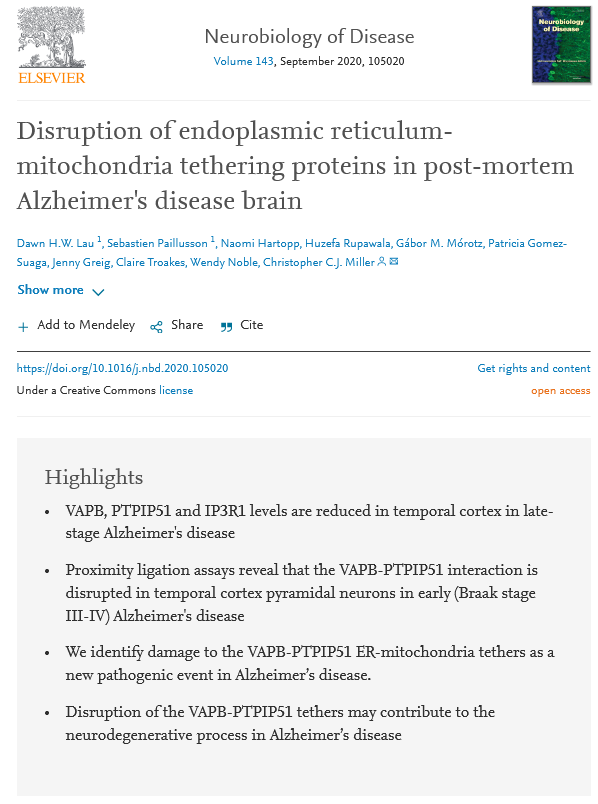11.06.2021
Disruption of endoplasmic reticulum-mitochondria tethering proteins in post-mortem Alzheimer's disease brain
Neurobiology of Disease, 2020
Abstract
Signaling between the endoplasmic reticulum (ER) and mitochondria regulates a number of key neuronal functions, many of which are perturbed in Alzheimer's disease. Moreover, damage to ER-mitochondria signaling is seen in cell and transgenic models of Alzheimer's disease. However, as yet there is little evidence that ER-mitochondria signaling is altered in human Alzheimer's disease brains. ER-mitochondria signaling is mediated by interactions between the integral ER protein VAPB and the outer mitochondrial membrane protein PTPIP51 which act to recruit and “tether” regions of ER to the mitochondrial surface. The VAPB-PTPIP51 tethers are now known to regulate a number of ER-mitochondria signaling functions including delivery of Ca2+from ER stores to mitochondria, mitochondrial ATP production, autophagy and synaptic activity. Here we investigate the VAPB-PTPIP51 tethers in post-mortem control and Alzheimer's disease brains. Quantification of ER-mitochondria signaling proteins by immunoblotting revealed loss of VAPB and PTPIP51 in cortex but not cerebellum at end-stage Alzheimer's disease. Proximity ligation assays were used to quantify the VAPB-PTPIP51 interaction in temporal cortex pyramidal neurons and cerebellar Purkinje cell neurons in control, Braak stage III-IV (early/mid-dementia) and Braak stage VI (severe dementia) cases. Pyramidal neurons degenerate in Alzheimer's disease whereas Purkinje cells are less affected. These studies revealed that the VAPB-PTPIP51 tethers are disrupted in Braak stage III-IV pyramidal but not Purkinje cell neurons. Thus, we identify a new pathogenic event in post-mortem Alzheimer's disease brains. The implications of our findings for Alzheimer's disease mechanisms are discussed.
This study used Atlas Antibodie´s polyclonal anti-PTPIP51/RMDN3 antibody (ATA-HPA009975, with PLA and WB) and the polyclonal anti-SigmaR1 (ATA-HPA018002, with WB) antibody.
>> View article


